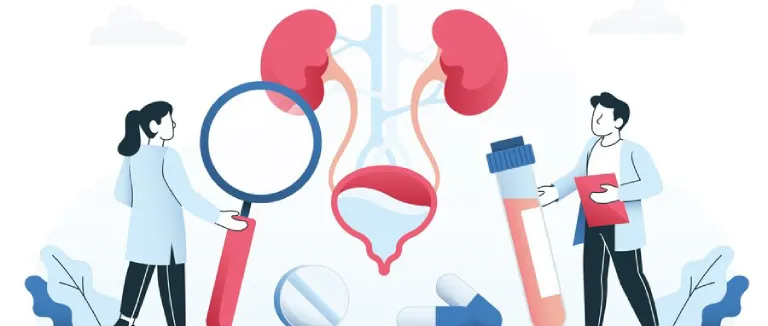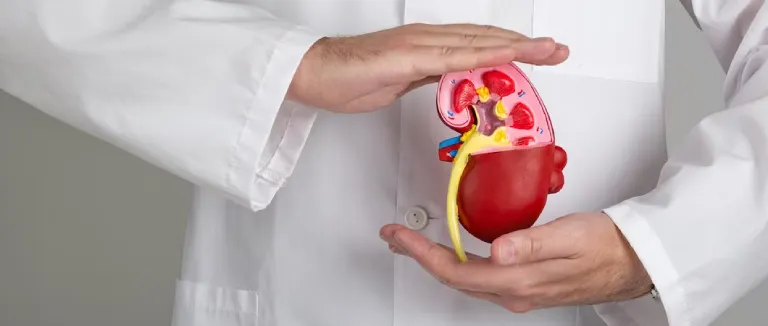-
Types and Causes of Kidney Cysts
-
Kidney Cyst Symptoms and Diagnosis
-
Effective Treatment Options for Kidney Cysts
-
Complications and Risk Factors of Kidney Cysts
-
Living with Kidney Cysts
-
Prevention and Long-Term Outlook for Kidney Cysts
-
Seeking Medical Guidance and Support for Kidney Cysts
A kidney cyst is a fluid-filled sac that forms within or on the surface of the kidneys. These cysts are typically benign and can vary in size, ranging from small and harmless to larger ones that may cause symptoms or complications. They are often discovered incidentally during medical imaging tests and can be categorized as simple (typically benign and asymptomatic) or complex (may have irregular shapes or solid components, requiring closer evaluation).
In this article, our aim is to provide you with a deep understanding of kidney cysts, along with effective management strategies. We're going to talk about types and causes, symptoms and diagnosis, treatment options, complications, or prevention, and everything you can wonder about kidney cysts.

Types and Causes of Kidney Cysts
Understanding kidney cysts begins with knowing their types and causes. Kidney cysts can be categorized into various types, each with its unique characteristics. From simple, benign fluid-filled sacs to the genetic condition known as Polycystic Kidney Disease (PKD) and acquired cysts associated with other health conditions, we'll delve into the intricacies of each. This knowledge is crucial in determining appropriate management and treatment strategies suitable for your specific situation.
Simple Kidney Cysts Explained
Simple kidney cysts are common, benign fluid-filled sacs that can develop in the kidneys. These cysts typically pose no immediate health threat and often go unnoticed. They may generally considered as harmless. But still, understanding these benign cysts is essential for distinguishing them from more complex kidney conditions and making informed decisions about your health.
Polycystic Kidney Disease (PKD)
Polycystic Kidney Disease (PKD) is a genetic disorder characterized by the development of fluid-filled cysts in the kidneys. There are two main types: Autosomal Dominant PKD (ADPKD), typically diagnosed in adulthood, and Autosomal Recessive PKD (ARPKD), usually diagnosed in childhood. PKD can lead to kidney problems, high blood pressure, and, in severe cases, kidney failure. Management includes symptom control, blood pressure management, and, in advanced cases, dialysis or kidney transplantation.
Acquired Kidney Cysts
Acquired kidney cysts are fluid-filled sacs. They develop in the kidneys due to factors like aging, kidney injuries, or medication use. They generally don't cause symptoms and they are found incidentally through imaging. Besides they usually don't cause such things, in some cases they may cause pain or other comlications. So if they cause discomfort you may have a treatment for draining the cyst or surgivally removing it.
Kidney Cyst Symptoms and Diagnosis
Detecting kidney cysts early is essential. So in this section we'll delve into the diagnostic process, highlighting the essential imaging and diagnostic tests used to confirm the presence of cysts in the kidneys.
Detecting Kidney Cysts
Detection of kidney cysts is made with advanced imaging and diagnostic tests. This diagnostic test procedure may include ultrasound, CT scans, and MRI scans. Understanding the diagnostic tools and their capabilities will empower you to collaborate effectively with healthcare professionals to reach a precise diagnosis and develop a tailored treatment plan.
Common Symptoms and Early Warning Signs of Kidney Cysts
Kidney cysts symptoms can vary. They may include pain, discomfort, urinary changes, or complications such as infection or bleeding. Recognizing these signs early can help you seek medical attention and prevent potential complications with early treatment.
Effective Treatment Options for Kidney Cysts
Once kidney cysts are diagnosed, it's crucial to explore effective treatment options. Our experts will provide valuable insights into various management strategies. Whether you're considering monitoring, drainage procedures, or surgical removal, we'll guide you through the decision-making process, ensuring you make the right choices for your specific condition.
Monitoring and Watchful Waiting
Not all kidney cysts require immediate intervention. Sometimes they don't cause any discomfort or major medical problems so the treatment may not be necessary. However your doctor will still want you to make regular visits to watch the situation. If they realize any bad changes like a growing cyst or symptoms like pain, developping infections or urinary problems they may offer you a suitable treatment before it gets worst.
Drainage Procedures for Symptomatic Kidney Cysts
When kidney cysts cause symptoms or complications, drainage procedures may be necessary. We will outline what to expect during these procedures, including minimally invasive techniques like percutaneous cyst aspiration and sclerotherapy. Understanding the process and potential outcomes can alleviate concerns and facilitate informed decision-making.
Surgical Removal of Kidney Cysts
For complex or symptomatic kidney cysts, surgical removal may be recommended. Our experts will provide a detailed overview of the surgical procedure, including the techniques used and what to expect during recovery. Talking with your doctor and knowing the details of the process can help you prepare mentally and physically for the surgery.
Managing Polycystic Kidney Disease (PKD)
Unlike the cysts that can be removed or drained with a single short term treatment, Polycystic Kidney Disease (PKD) requires long-term management. An effective management of PKD, includes medication, lifestyle modifications, and monitoring. By following expert guidance, individuals with PKD can enhance their overall health and quality of life.
Complications and Risk Factors of Kidney Cysts
Understanding the potential complications and risk factors associated with kidney cysts is vital for proactive management. As we said before, being aware of a medical situation helps you to take the necessary precautions and get to the action in the right way. So when it comes to the kidney cysts, it's quite important to know the risk factors and complications of kidney cyst to avoid the risks and recognize the problems. That's why in the following parts we'll talk about these risks factors and complications.
Understanding Complications Linked to Kidney Cysts
Kidney cysts can potentially lead to several complications. These cysts may become infected, causing pain and fever. Additionally, they can rupture, leading to bleeding within the kidney. Since kidneys are the organs that cleans your blood and produce urine, you may also find the signs of the problems in the related things. In rare cases, cysts may grow large enough to compress nearby structures, causing discomfort and affecting kidney function. Regular monitoring and early intervention can help prevent or manage these complications effectively.
Identifying Risk Factors for Kidney Cysts
Risk factors for kidney cysts include advancing age, as they are more common in older individuals. A family history of kidney cysts or certain genetic conditions can also increase the risk. Individuals with polycystic kidney disease (PKD) are at a higher risk for cyst formation. Recognizing these risk factors can prompt earlier screening and detection.We can count some of the risk factors as the followings:
Age: Kidney cysts become more common with age, particularly in individuals over 50. They are often a part of the normal aging process.
Genetics: A family history of kidney cysts or polycystic kidney disease (PKD) can significantly elevate the risk. PKD is an inherited condition characterized by numerous cysts in the kidneys.
Gender: Men are slightly more likely than women to develop kidney cysts.
Kidney Disorders: People with certain kidney conditions or diseases, such as medullary sponge kidney or tuberous sclerosis complex, may be at a higher risk for cyst formation.
High Blood Pressure (Hypertension): Uncontrolled high blood pressure can contribute to the development and growth of kidney cysts. It's both a risk factor and a potential consequence of cysts.
Chronic Kidney Disease (CKD): Individuals with CKD, which can result from various causes like diabetes or hypertension, may be more prone to developing kidney cysts.
Smoking: Smoking has been associated with an increased risk of kidney cysts and kidney disease in general.
Certain Medications: Long-term use of certain medications, such as nonsteroidal anti-inflammatory drugs (NSAIDs), may contribute to the development of kidney cysts in some cases.

Living with Kidney Cysts
Living with kidney cysts often requires a proactive approach to monitoring and management. The patients should take a good care of self under the medical surveillance and control. As we said before many kidney cysts are asymptomatic and do not require immediate treatment. Regular check-ups and imaging tests are essential to track any changes in the size or appearance of cysts. When symptoms do arise, healthcare professionals can provide guidance on pain management and necessary interventions.
Lifestyle Tips for Kidney Cyst Management
Well, controlling the situation and preventing it from going worst is up to you. If you follow the doctors advices and take care of yourself you can prevent your cyst from getting harmfull. So let's see some tips that will help your kidneys:
Stay Hydrated: Adequate hydration is essential for kidney health. Drinking enough water helps flush waste products and toxins from your body. Aim for at least 8-10 cups of water per day, or more if recommended by your healthcare provider.
Balanced Diet: Maintain a balanced diet that includes a variety of fruits, vegetables, whole grains, lean proteins, and healthy fats. Limit your sodium (salt) intake, as high sodium levels can increase blood pressure and strain your kidneys.
Monitor Blood Pressure: Keep a close watch on your blood pressure. High blood pressure can contribute to kidney cyst growth and other kidney problems. Follow your healthcare provider's recommendations for blood pressure management, which may include medication and lifestyle changes.
Regular Exercise: Engage in regular physical activity. Exercise can help manage blood pressure, improve circulation, and maintain overall health. Consult your healthcare provider before starting a new exercise routine, especially if you have specific medical conditions.
Avoid Smoking: If you smoke, consider quitting. Smoking can harm kidney function and exacerbate kidney-related issues, including cysts.
Limit Alcohol: Excessive alcohol consumption can strain the kidneys and may interact negatively with certain medications. If you drink alcohol, do so in moderation, following the guidelines provided by your healthcare provider.
Manage Stress: Chronic stress can impact overall health, including kidney function. Explore stress-reduction techniques such as mindfulness, meditation, yoga, or relaxation exercises.
Medication Management: If you're taking medications for other health conditions, ensure you follow your prescribed regimen and discuss any potential interactions with your healthcare provider.
Regular Check-ups: Maintain regular follow-up appointments with your healthcare team. They can monitor the status of your kidney cysts through imaging tests and provide guidance based on your individual situation.
Stay Informed: Educate yourself about kidney cysts, their potential complications, and the signs of any problems. Being informed can help you take prompt action if necessary.
Dietary Recommendations for Kidney Cyst Patients
While there are no specific dietary guidelines exclusively for kidney cysts, a balanced diet that is low in sodium and saturated fats can be beneficial. Reducing sodium intake helps manage blood pressure, which is important for kidney health. Staying adequately hydrated supports overall kidney function. However, it's essential for individuals with kidney cysts to consult with a healthcare professional for personalized dietary recommendations. Because the precautions and the priorities can change from person the person. For example if you have also another kidney problem you may need a specific balanced diet to take care the both problem.
Prevention and Long-Term Outlook for Kidney Cysts
Preventing the development or recurrence of kidney cysts is possible by being aware of it and staying away from the risk factors. They, especially those related to aging, are often not preventable. Preventive measures mainly involve managing underlying conditions that may contribute to cyst formation, such as high blood pressure or diabetes. The long-term outlook for individuals with kidney cysts varies widely, depending on factors like cyst size, symptoms, and any associated complications. Regular medical follow-ups are crucial to monitor changes and ensure early intervention when necessary.
Can Kidney Cysts Be Prevented?
In most cases, kidney cysts cannot be prevented, particularly those linked to aging or genetic factors. Focusing on a healthy lifestyle and managing underlying health conditions can potentially reduce the risk of complications, but cyst formation itself is typically not preventable.
Prognosis and Long-Term Outlook for Kidney Cyst Patients
The prognosis for individuals with kidney cysts varies. Many people with small, asymptomatic cysts can lead normal lives without significant complications. However, those with larger cysts, symptoms, or associated kidney problems may require ongoing management and potentially interventions like cyst drainage or surgery. Regular medical evaluations are essential to assess the long-term outlook for each individual.
Seeking Medical Guidance and Support for Kidney Cysts
Navigating kidney cysts often requires guidance and support from healthcare professionals. In this section, we'll share expert tips on when to consult a healthcare professional, how to prepare for appointments, and the importance of open communication with your medical team. Seeking the right guidance is crucial for effective management.
When to Consult a Healthcare Professional for Kidney Cysts
It is advisable to consult a healthcare professional if you experience symptoms such as persistent pain, blood in the urine, or if you have concerns about kidney cysts. Additionally, individuals with known kidney cysts should maintain regular follow-up appointments with their healthcare team to monitor changes in cysts and overall kidney health.
Support Groups and Resources for Kidney Cyst Patients
Support groups and resources can be invaluable for individuals dealing with kidney cysts. These organizations offer information, emotional support, and connections with others who share similar experiences. Some resources include the PKD Foundation for those with Polycystic Kidney Disease and local support groups that may be available for individuals with kidney cysts.
* Contents of this page is for informational purposes only. Please consult your doctor for diagnosis and treatment. The content of this page does not include information on medicinal health care at Liv Hospital







